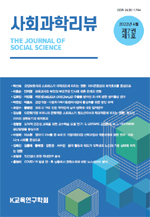본 연구는 고등학생의 건강한 사회적 관계 형성을 위한 효과적인 방안을 모색하기위해 사회적 위축이 발현되는 심리적 기제를 규명하고자 자아존중감이 주요 내면화 문제인 우울 및 신체화 증상을 매개로 하여 사회적 위축에 어떠한 영향을 미치는지 실증적으로 검증하고자 하였다. 이러한 목적을 달성하기 위해, 본 연구에서는 한국아동·청소년패널조사 2018(KCYPS 2018) 중학교 1학년 코호트의 6차년도 데이터를 활용하여 분석을 진행하였으며, PROCESS Macro 4.3의 model 6을 활용한 부트스트래핑을 통하여 자아존중감과 사회적 위축 간의 관계에서 우울 및 신체화 증상의 매개효과의 유의성을 검증하였다. 분석 결과, 자아존중감은 우울 및 신체화 증상을 통하여 사회적 위축에 영향을 미치며, 이러한 연속다중매개효과는 통계적으로도 유의한 것으로 확인되었다. 또한 자아존중감과 사회적 위축 간의 관계에서 우울은 통계적으로 유의한 완전 매개효과를 가지는 반면, 신체화 증상의 매개효과는 유의하지 않은 것으로 나타났다. 이러한 본 연구의 결과는고등학생의 사회적 위축을 완화하기 위해서는 자아존중감 증진뿐만 아니라, 우울 및 신체화 증상과 같은 내면화된 문제에 대한 개입이 필수적임을 시사한다.
This study examined how to mitigate social withdrawal in high schoolstudents by exploring the serial multiple mediating roles of depression and somaticsymptoms in the relationship between self-esteem and social withdrawal. Data weredrawn from the sixth wave of the Grade 7 cohort in the 2018 Korean Children andYouth Panel Survey(KCYPS 2018). Multiple regression analysis was conducted, andthe significance of mediating effects was tested using bootstrapping with PROCESSMacro 4.3(Model 6). The results showed that self-esteem influenced socialwithdrawal through a sequential pathway involving depression and somaticsymptoms, and this serial multiple mediation effect was statistically significant. These findings highlight the need for interventions that not only enhanceself-esteem but also focus on the early detection and prevention of depression andsomatic symptoms to effectively reduce adolescent social withdrawal.
Ⅰ. 서 론
Ⅱ. 선행연구 고찰
Ⅲ. 연구방법
Ⅳ. 연구결과
Ⅴ. 논의
참고문헌
(0)
(0)
